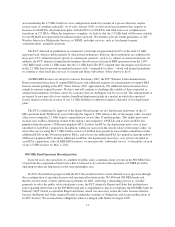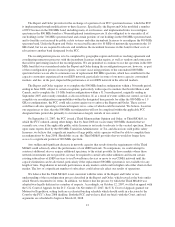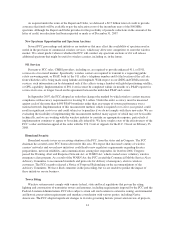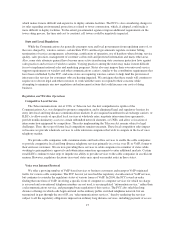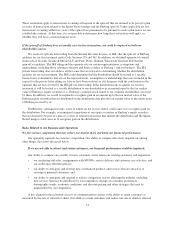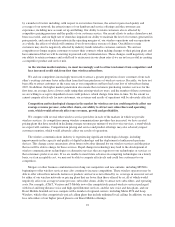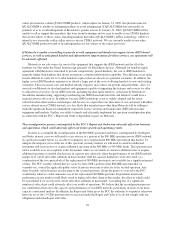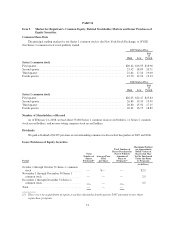Sprint - Nextel 2007 Annual Report Download - page 23
Download and view the complete annual report
Please find page 23 of the 2007 Sprint - Nextel annual report below. You can navigate through the pages in the report by either clicking on the pages listed below, or by using the keyword search tool below to find specific information within the annual report.These restrictions apply to transactions occurring subsequent to the spin-off that are deemed to be part of a plan
or series of transactions related to the Sprint-Nextel merger and the Embarq spin-off. Under applicable tax law,
transactions occurring within two years of the spin-off are presumed to be pursuant to such a plan unless we can
establish the contrary. At this time, it is not possible to determine how long these restrictions will apply, or
whether they will have a material impact on us.
If the spin-off of Embarq does not qualify as a tax-free transaction, tax could be imposed on both our
shareholders and us.
We received a private letter ruling from the Internal Revenue Service, or IRS, that the spin-off of Embarq
qualifies for tax-free treatment under Code Sections 355 and 361. In addition, we obtained opinions of counsel
from each of Cravath, Swaine & Moore LLP and Paul, Weiss, Rifkind, Wharton & Garrison LLP that the
spin-off so qualifies. The IRS ruling and the opinions rely on certain representations, assumptions and
undertakings, including those relating to the past and future conduct of Embarq’s and our business. The IRS
private letter ruling does not address all the issues that are relevant to determining whether the distribution
qualifies for tax-free treatment. The IRS could determine that the distribution should be treated as a taxable
transaction if it determines that any of the representations, assumptions or undertakings that were included in the
request for the private letter ruling are false or have been violated, or if it disagrees with the conclusions in the
opinions that are not covered by the IRS private letter ruling. If the distribution fails to qualify for tax-free
treatment, it will be treated as a taxable distribution to our shareholders in an amount equal to the fair market
value of Embarq’s equity securities (i.e., Embarq’s common stock issued to our common shareholders) received
by them. In addition, we would be required to recognize gain in an amount up to the fair market value of the
Embarq equity securities that we distributed on the distribution date plus the fair market value of the senior notes
of Embarq received by us.
Furthermore, subsequent events, some of which are not in our control, could cause us to recognize gain on
the distribution. For example, even minimal acquisitions of our equity securities or Embarq’s equity securities
that are deemed to be part of a plan or a series of related transactions that include the distribution and the Sprint-
Nextel merger could cause us to recognize gain on the distribution.
Risks Related to our Business and Operations
We face intense competition that may reduce our market share and harm our financial performance.
Our operating segments face intense competition. Our ability to compete effectively depends on, among
other things, the factors discussed below.
If we are not able to attract and retain customers, our financial performance could be impaired.
Our ability to compete successfully for new customers and to retain our existing customers will depend on:
• our marketing and sales, arrangements with MVNOs, service delivery and customer care activities, and
our credit and collection policies;
• our ability to anticipate and develop new or enhanced products and services that are attractive to
existing or potential customers; and
• our ability to anticipate and respond to various competitive factors affecting the industry, including
new services that may be introduced by our competitors, changes in consumer preferences,
demographic trends, economic conditions, and discount pricing and other strategies that may be
implemented by our competitors.
A key element in the economic success of communications carriers is the ability to retain customers as
measured by the rate of subscriber churn. Our ability to retain customers and reduce our rate of churn is affected
21


